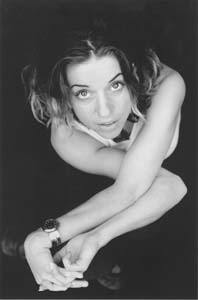![[Metroactive Music]](/music/gifs/music468.gif)
[ Music Index | Metro | Metroactive Central | Archives ]
Movin' on 'Up Up' With Ani DiFranco
 Trickle-Up Theory: The hardships of a dying steel town get turned into song on Ani DiFranco's 'Up Up Up Up Up Up.'
Trickle-Up Theory: The hardships of a dying steel town get turned into song on Ani DiFranco's 'Up Up Up Up Up Up.'Albert Sanchez
Rough, cocky and vulnerable, Ani DiFranco rewards her fans' obsessions on her new album, 'Up Up Up Up Up Up' By Michelle Goldberg I USED TO LIVE next door to Ani DiFranco's offices in Buffalo, N.Y., and the photograph on the back cover of her new album is the same view I saw every morning from my bedroom window. Buffalo is snowy and gray, sad and desperate, and I left a long time ago and never went back, so it's odd that listening to Up Up Up Up Up Up (Righteous Babe Records) is making me as sentimental as I've been since I was a kid sobbing along to Morrissey. Buffalo is a rock & roll kind of town, so when I fled to New York City I rejected that kind of noise and fell in love with synthesizers, samplers, drum machines and turntables. It was the sound of the future, of the metropolis and of celebration--and a teenager on her own in Manhattan has a lot to celebrate. Still, listening the new DiFranco album, I think that I sacrificed something big when I stopped depending on that passionate identification with a singer's words, and I'm grateful to her for giving some of that feeling back to me. Of course, I'm not the only girl to feel such a strange symbiotic connection to DiFranco. Ani fans are famous for their insane devotion, and she herself has often sung about being annoyed and even scared by her acolytes' vampiric obsession with her image. But what an image! She's rough, cocky and rawly vulnerable, sublimely impervious to fame and glamour--though both fame and glamour came to her easily enough. Critics have often complained about her too-earnest politics and her incessant self-referentiality (songs like "Little Plastic Castles," from the album of the same name, are primarily about her own press coverage). But such objections miss the point--for her fans, DiFranco's career trajectory is inseparable from her music. Each album--and they come out with delicious regularity, usually one a year--is an update on an epic in which her fans have made a heartfelt investment. Can one righteous babe go into the world with just her Day-Glo hair and guitar, can she win love, keep her sense of humor, dis the record companies, navigate the media, grow as an artist, stay honest--in short, can she be everything we wish we were and still stay flawed and real enough so that we can imagine she's just like us? Basically, yes. On Up Up Up Up Up Up, DiFranco retains her endearing earthy frankness, her unapologetic idealism and her commitment to folk music. But she's also grown as a singer, as a writer and as a musician. DiFranco's phrasing has always had a bit of a jazz cadence, but here that tendency shows more prominently. The new album was recorded in New Orleans, and you can hear that city's sultry, swirling, loose-limbed funk in "Know Now Then" and the rocker "Hat Shaped Hat." I love the way her voice curls and growls on "Virtue," the way it drops to a quiet, almost spoken-word whisper before roaring back for the rousing, bluesy chorus. On songs like the gorgeous, jazzily syncopated "Angel Food," an upright bass, a Wurlitzer organ and an accordion create a haunting atmosphere that perfectly complements the spine-tingling vocals. FOR PERSONAL reasons, though, I was most moved by "Trickle Down," which captures Buffalo's utter desolation after Bethlehem Steel, the town's main industry, closed its doors, seemingly leaving everyone's father jobless. Whispery-slow and thick with the city's wintry melancholy, "Trickle Down" is angry and political without being pedantic. Here in sparkling, prosperous California, such a dirge may sound outdated--after all, who's talking about Reaganomics anymore? (That may be another reason electronic music is so captivating--things are good, let's dance!) But for all that Buffalo--and lots of other industrial cities--has benefited from the long boom, it may as well still be 1984. That's not to say that anyone should buy Up Up Up Up Up Up out of some weird outbreak of liberal guilt. It's just that in our delirious, decadent age, a song of social protest that's neither insipidly PC nor annoyingly self-righteous is refreshing. These days, every other rock band and singer/songwriter seems to be glomming on to electronica--Mercury Rev, Girls Against Boys, Cat Power and Garbage are recent examples. That's not a bad thing--samplers, keyboards and computers can propel a band, expand its options, make rock seem relevant again. It's immensely comforting, though, that one woman can stand against trends, laugh at the mindset of the moment, refuse to be ashamed of her beliefs and still be far hipper than anyone else on the radio. [ San Jose | Metroactive Central | Archives ]
|
From the January 14-20, 1999 issue of Metro.
Copyright © Metro Publishing Inc. Maintained by Boulevards New Media.